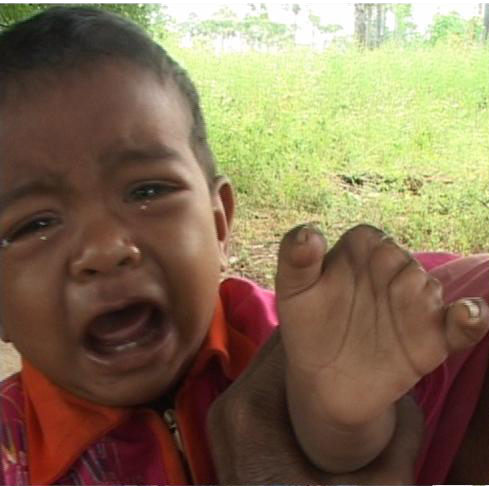Asha Menon
There are four things we live in fear of — police, elephants, the Maoists and the harmath,” said Rukmini in a village near Lalgarh in West Bengal’s West Midnapore district. “They are thieves.”“They even steal eggs,” says another woman listening in. But they are not harmless pranksters. The harmath is the armed militia of the ruling Communist Party of India (Marxist). They loot, plunder, rape and assault villagers and villages suspected of having other political affiliations. In 2008, in Nandigram, before the gram panchayat elections, they snatched away the voter identification of people in Nandigram. At least 10 to 15 people were admitted in the local hospital, in “critically injured condition”, reported The Times of India.In Bankura district, Baksi village was emptied of 70 per cent of its residents by a joint force of police and the harmath.
“They misbehave with the women and burn our food stocks,” says Satyan Hansda. “The police do nothing.” The intimidation was to stop all groupings they suspected of political ambitions. “The PCPA does not function here because most of its members were driven away. They keep beating us saying that we are Maoists. We have not even seen a Maoist in our village.” A senior CPM leader accepts, on condition of anonymity, that the party maintains an armed group of “volunteers”. “There is dadaism. Not everyone in the party favours force to regain lost areas and there is factionalism within the party over this.” He adds after a while, “but every party has an armed wing, even the Trinamool Congress.”The term harmath came into the Bengali lexicon with the Portugese raiders who came in the 15th century. “They travelled in groups and were ruthless.” The word had not been used in the local vocabulary for years but it regained popularity during the Nandigram struggle, when people started calling the CPM goons by this name.“It could be the people who were attacked themselves, it could be the intelligentsia who were commenting on it, nobody knows for sure how the word became popular again. But today, it is a term used to refer to CPM goons,” says Jagabandhu Adikhari of the Association of People for Democratic Rights (APDR).
These types of armed groups have been part of the CPM from the Eighties, according to Adhikari. “But the concentration of the harmath group has definitely increased in the past few years.”“The primary task of this group is to make sure that no other political party or organisation can function in an area,” says Pratyut Ghosh, the Trinamool Congress District Secretary of the West Midnapore region. And to do this, they do not look for people who are ideologically inclined. They simply pay people with criminal records, according to Adhikari. “Sometimes they coerce people with criminal records to work for them or risk being arrested again.” Their job could also be to spy on their own neighbours. “Harmath sometimes cover their faces and attack, because they are neighbours or from neighbouring villages,” says Ashish Mahato, spokesperson of the People’s Committee against Police Atrocities. Harmath are hired by giving a lump sum — two to four lakh rupees — to a family and then they are promised an amount at regular intervals. “If a harmath runs a successful campaign (which means to get rid of, chase away or silence people who have other political leanings) then he is rewarded with a few lakhs again.
A promise is made that if the harmath is killed in campaign, the family will be taken care of. But in the cases where we have heard, that support is discontinued in a few months.” In every village, either the harmath accompany the police or they follow the police. “The harmath are even trained by the police,” says Adhikari. How are they armed? “Every party has arms,” says the CPM leader. “The ruling party keeps arms, so does the opposition.” According to the TMC secretary, ‘they get their arms from Bihar and Pune.” The funding is done through a teacher’s network. “The government appoints teachers. If they want the posting, they need to pledge a portion of the salary to the funding of this group,” says Congress district secretary of West Midnapore, Nirmal Ghosh. Adhikari says the relationship is a bit more complex. In 2008, teachers got an unexpected raise of a few thousands.
“Teachers were expected to give them a portion of the arrears. When one teacher in Chandrakona refused, he was accosted and threatened. Finally he had to give the Rs 10,000 they demanded of him.” The contribution can vary between Rs 5,000 and Rs 20,000, according to Adhikari.The CPM leader is not happy with the compromises the party has made over the years. “When we started, we had a list of do’s and don’ts. Over the past 32 years as the ruling party, we seem to be doing more of the dont’s.” People like him want the party to lose this time around so that they can rework internally and improve it, says his friend laughing. The leader does not argue.— ashamenon E Buzz




 The blaze at the sponge iron factory. (Samir Mondal)
The blaze at the sponge iron factory. (Samir Mondal)

